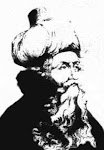
"The Prophet said "Gabriel once came to me and said: "The Lord of Truth has instructed me to tell you:'Pardon those who do you wrong. Maintain a connection with those who would cut you off. Give to those who deprive you. Reflect on the blessings of Allah, on His handiwork and His ways of managing His creation.
If you suffer unjust treatment, do not act unjustly. If you are praised, do not feel too pleased about it. If you are criticised, do not feel too depressed. If you are accused of telling lies, do not get angry. If you are betrayed, do not betray another."
 Shaykh Qadir Al Jilani on the Sufis: "In your case, you belong to the group consisting of those who love Allah both through involuntary compulsion and through a process of free choice.
Shaykh Qadir Al Jilani on the Sufis: "In your case, you belong to the group consisting of those who love Allah both through involuntary compulsion and through a process of free choice.
If only you would leave the company of the unbelievers and the hypocrites today, and stay away from them tomorrow. If only you would get up and walk away from meetings held by those who idolise their fellow creatures and material means, and who quarrel with the Lord of Truth. Do not meddle with the treasuries of worldly kings, and do not pry into their secrets.
If a person does not acknowledge his own worth, the decrees of destiny will teach him to acknoledge his own worth. To recognise your own worth is better than refusing to acknowledge you own worth, because an ignorant person is someone who knows neither his own worth nor the worth of other people."
 "You must dedicate your hearts entirely to Him. You must turn to Him in humble entreaty, and beg Him to supply you with everything you need. You must apply to Him for all your urgent requirements. You have no other place to turn. You have no other door by which to enter. All other doors have been locked shut. You must spend time alone with Him in lonely places. You must talk to Him and speak to Him directly with the tongues of your faith.
"You must dedicate your hearts entirely to Him. You must turn to Him in humble entreaty, and beg Him to supply you with everything you need. You must apply to Him for all your urgent requirements. You have no other place to turn. You have no other door by which to enter. All other doors have been locked shut. You must spend time alone with Him in lonely places. You must talk to Him and speak to Him directly with the tongues of your faith.
As soon as the other members of your family have all gone to sleep, and the sounds and voices of your fellow creatures have fallen silent, you should cleanse yourself by performing the ritual ablution, then lower your forehead to the ground. While you are in humble posture, you should repent, beg pardon, confess your sins, implore your Lord to grant His gracious favour, and ask Him to supply your needs. You should also complain to Him about any problems that are causing a feeling of tightness in your breast. He is your Lord, not any other, and He is your god, not any other.
You must not run away on account of the arrows of His afflictions. He has treated all your predecessors in the same way, exposing them to pain and suffering, making them experience difficulty and hardship as well as ease and comfort, so that they might acknowledge Him and be grateful to Him, so that they might learn to be patient with Him and entrust themselves to His care.
Punishments are for common folk, while acts of atonement are for the truly devout believers, and spiritual degrees are for the righteous of true conviction, the triumphant champions of truth.
The Prophet has told us: "Of all people, we Prophets are the ones most sorely afflicted. Then those who resemble us most closely, and so on down the scale."
When the true believer is afflicted, he bears his affliction with patience. He keeps it well hidden from his fellow creatures and does not complain to them. This is why the Prophet has told us: "the believer wears his cheerfulness on his face, while his sadness stays inside his heart."
That is to say, he greets other people with a cheerful expression, so that they will not notice what is in his heart.
True believers hide the treasures of their inner beings. They act in accordance with the natural disposition of their hearts. Sadness is the natural disposition of our lower selves. Sadness is a cloud that showers the heart with drops of wisdom and secret knowledge. Why will you not be patient in bearing sadness and broken-heartedness, when Allah has said in one of His utterances: "I am with those whose hearts are broken on My account."
Whenever their hearts are broken because of remoteness [from Him], along comes the mender of nearness to mend them. Whenever they are alienated from their fellow creatures, along comes intimate friendship with Allah to put them at their ease. Whenever they become estranged from their fellow creatures, they discover intimate friendship in the nearness of Allah. Whenever their sadness lasts for a long time in this world, their happiness is of long duration in the hereafter.
 The Prophet would often experience prolonged bouts of sadness, and he was always given to contemplation. He would seem to be listening carefully, as if to an invisible speaker who was talking to him, or to someone calling out to him from the unseen. His executors, his representatives, his deputies and his heirs are likewise notable for the long duration of their sadness and the constancy of their contemplation. How could they fail to follow the example he set by his actions, when they are standing in his stead, feeding people with his food and quenching their thirst with his drink, using his horses for transport, and wielding his swords and his spears in battle?
The Prophet would often experience prolonged bouts of sadness, and he was always given to contemplation. He would seem to be listening carefully, as if to an invisible speaker who was talking to him, or to someone calling out to him from the unseen. His executors, his representatives, his deputies and his heirs are likewise notable for the long duration of their sadness and the constancy of their contemplation. How could they fail to follow the example he set by his actions, when they are standing in his stead, feeding people with his food and quenching their thirst with his drink, using his horses for transport, and wielding his swords and his spears in battle?

The people of the Lord have inherited the situation of the Prophets and their position in the scheme of things, though not their personal names and titles, nor the special attributes and peculiar virtues with which they never fall short. It may therefore happen that one of them begins to play his role at a very early age, while in the case of another, his true role does not become apparent until the latter part of his life. Transformations are brought about through the presence of such an individual, for he is the friend of Allah in the knowledge of Allah.
 The Tomb of Shaykh Qadir Al Jilani
The Tomb of Shaykh Qadir Al Jilani
(which was hit by US bombings in Iraq)
Of the ignorant people, the Shaykh said:
"You do not recognise the true condition of the people of the Lord, and you do not acknowledge the truth of what they have to say. Your involvement with worldly creatures is an obstacle that prevents you from getting to know them. Your love of prestige in this world, and the ambitious pursuit of political leadership, these are obstacles that prevent you from getting to know them. If you had been genuinely interested in trying to find them, you would have recognised them by now, and you would have derived complete satisfaction from what they had to tell you. You do not spend any time in the company of people who put their knowledge into practice. You are not like those who drink what they have to offer, here in my presence, so you do not experience the effect of that kind of wine."









No comments:
Post a Comment